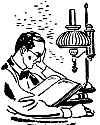|
Taking
pictures was more than a hobby in those days - it was an
expedition! The young enthusiast soon discovered that he would either
have to give up the hobby or get a horse and wagon to haul the
equipment.
So he decided to do something about it. He analyzed the equipment and found that the tent and the nitrate bath were necessary only because of the wet plates used in those days. So the first job was to get rid of this type of plate.  For three years Eastman worked on this problem - night and day in his
spare time. He even took courses in foreign languages so he could read
the existing literature on photographic plates.
For three years Eastman worked on this problem - night and day in his
spare time. He even took courses in foreign languages so he could read
the existing literature on photographic plates.A few dry plates were made, but it was by a very tedious process, so Eastman studied how such plates might be made more available. His problem was to find some easier way of getting the light sensitive chemical on the plate in a dry state. After months of work, and countless experiments, he perfected a machine for producing gelatine-coated dry plates. These could be exposed and then shipped back to a laboratory to be developed. The outdoor photographer no longer had to carry the tent, developing tanks, and solutions. |








